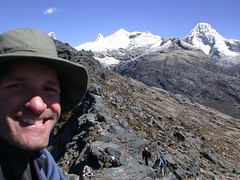Wednesday, January 25, 2006
Natural History
Sometimes it seems like good news is rare, but I think this story about the donation of a fossil-rich plot of ranchland in Wyoming definitely qualifies:
I've said this before elsewhere, but it deserves repeating: fossils often have a monetary value associated with them, to collectors and others who value their aesthetic appeal. But to the paleontologist and the natural historian, these things are often priceless. In many cases there is no replication of these delicate preserved specimens, from many tens of millions of years ago. I am very relieved to hear that at least in this instance, an area with the potential for significant scientific discovery is in the hands of people who will greatly cherish it for that purpose. Kudos to the rancher for his foresight and thoughtfulness.
tags: natural history, fossils
A Wyoming rancher with no connection to the University of Pittsburgh has given the school 4,700 acres of land littered with dinosaur fossils.
The university plans to maintain the land, valued at $7 million, for students and researchers in geology, archaeology and other disciplines. The university plans to team up on programs there with the University of Wyoming and Pittsburgh's Carnegie Museum of Natural History.
"They have a real gem out there," said Mary Dawson, a paleontologist at the Carnegie Museum who visited the ranch several years ago. The land is "littered with fossils."
Allen Cook of Wheatland, Wyo., said he was getting ready to sell part of his ranch and decided to donate land to the university after an appraiser put him in touch with Alec Stewart, dean of the university's honors college and the appraiser's graduate school classmate.
"The amazing thing is that Cook, who had absolutely no connection with the University of Pittsburgh, had decided that we would be good stewards for this treasure," Stewart said Tuesday.
The 57-year-old rancher said the university's interest "seemed kind of in line with what I'd like — that the land would be preserved."
I've said this before elsewhere, but it deserves repeating: fossils often have a monetary value associated with them, to collectors and others who value their aesthetic appeal. But to the paleontologist and the natural historian, these things are often priceless. In many cases there is no replication of these delicate preserved specimens, from many tens of millions of years ago. I am very relieved to hear that at least in this instance, an area with the potential for significant scientific discovery is in the hands of people who will greatly cherish it for that purpose. Kudos to the rancher for his foresight and thoughtfulness.
tags: natural history, fossils
Comments:
Post a Comment
